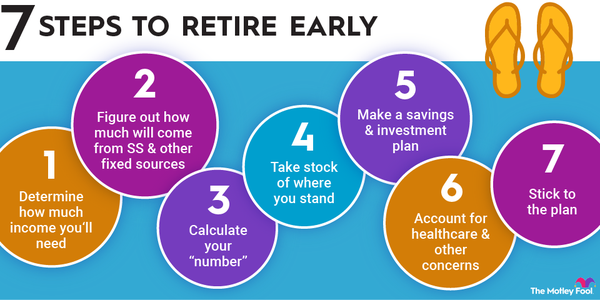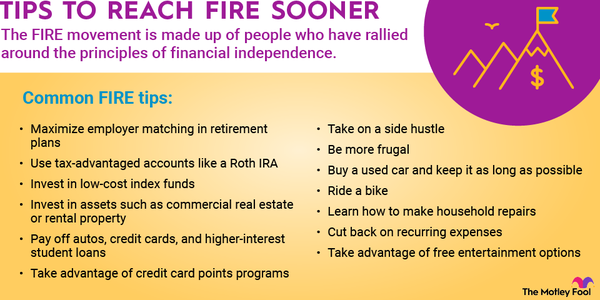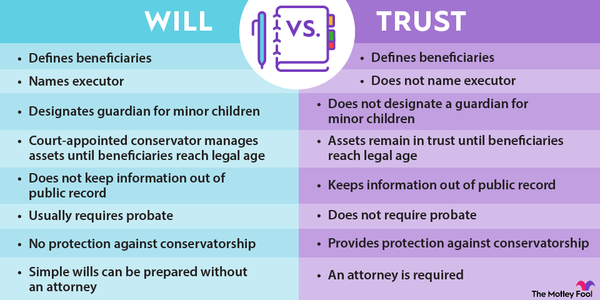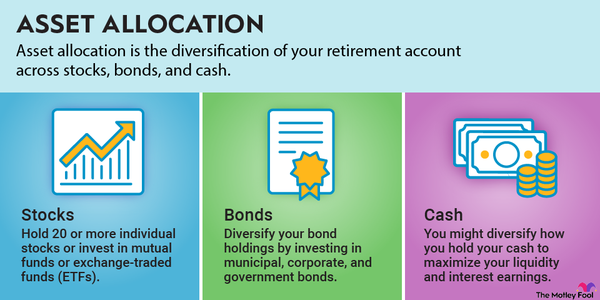Of course, you can choose to retire whenever you want. However, considering how much financial comfort you want to have after you retire is a smart way to approach your decision. With that in mind, here's a guide to some of the biggest concerns to keep in mind as you decide when you'll be able to comfortably retire.

How much income do you need?
Will you have enough income after you retire?
This is the No. 1 question that will determine whether you're ready to retire. Despite the popular misconception that you need to aim for a specific dollar amount in savings (like $1 million), the real question is how much income you'll have.
In other words, someone who has a large monthly pension but little in savings might be in better shape than someone with a few hundred thousand in the bank.
The average American should expect to need about 70%-80% of their pre-retirement income to sustain the same quality of life after retirement. The percentage can be higher or lower depending on your particular retirement vision, but this rule of thumb is a good starting point.
In retirement, your income can come from Social Security, other fixed sources such as pensions and annuities, and of course, your savings. So, the first step is to determine where your retirement income will come from. Do you have a 401(k)? A traditional or Roth IRA? Money in a standard savings account?
How much will come from Social Security?
When can you start collecting Social Security, and how much will you get?
Social Security is designed to replace about 40% of a person's pre-retirement income, but this can be much less for higher earners. While it won't likely be enough by itself, the retirement program is certainly a critical part of the equation.
Without getting too deep into the weeds, Social Security benefits are calculated based on your 35 highest-earning years. As of January 2025, the average retired worker's Social Security retirement benefit was about $1,975 per month, and the maximum possible benefit at full retirement age was $4,018.
To get a good estimate of how much you could get from Social Security, check out your latest Social Security statement by logging into your mySocialSecurity portal at www.ssa.gov.
When can you start collecting those benefit checks? The Social Security Administration (SSA) defines an official full retirement age based on your year of birth, though technically, any American who qualifies for a retirement benefit can start collecting it at any point after the age of 62.
However, choosing to start collecting Social Security at any age other than your full retirement age will permanently adjust your benefits up or down to compensate. If you claim Social Security at age 62, you'll receive smaller checks for more years; if you delay claiming until age 70, you'll receive larger checks over fewer years.
How much do you need to save?
How much do you need in savings?
Here's a quick calculation. Most retirement planners agree that you'll need about 80% of your pre-retirement income to sustain the same quality of life after you retire, so:
- First, take your current household income (pre-tax) and multiply it by 0.80.
- Divide the result by 12 to get an estimate of your monthly income needs in retirement. Keep this amount as is to simplify or adjust it higher or lower according to your retirement ambitions. For example, if you plan to travel the world after you retire or pursue an expensive hobby, you may want to plan on additional income.
- Next, subtract your estimated Social Security benefit, as well as any pension income you expect.
- What's remaining is the amount of income you'll need to generate from your savings each month, so multiply by 12 to determine how much you should plan to withdraw from your savings each year.
A standard rule of thumb says that you can reasonably expect to withdraw 4% of your savings in your first year of retirement, and increase this amount for cost-of-living adjustments in subsequent years, without having to worry about running out of money. While this rule is admittedly not perfect, it is a good estimate of retirement readiness.
To apply this rule, simply multiply the amount of retirement income you'll need from savings each year by 25. So, if you determine that you'll need $30,000 in annual retirement income from savings, you should aim for a $750,000 nest egg before you quit your job.
Related retirement topics
Determining your retirement
When can you retire?
The bottom line is that you'll be able to comfortably retire when the income streams you create -- Social Security, your savings, and any other sources you might have -- are enough to support your desired standard of living after you leave your job.
Of course, there's no one-size-fits-all answer here. Many retirees plan to travel the world after they retire, while others are perfectly content with living a simple (read: inexpensive) life. If you aren't sure if you're on track for the retirement you want, it's a smart idea to consult a financial planner who can assess where you stand and suggest a savings and investment plan to get you where you want to be.
FAQs
FAQs: When can I retire?
How can I calculate my retirement age?
Your ideal retirement age depends on a variety of factors, and not all of them are calculations. For example, many people retire early for health reasons, not because their financial calculator told them it was time. But the general idea is to figure out the age at which all of your income sources (Social Security, savings, etc.) will be sufficient to support your lifestyle.
Is it better to take Social Security at 62 or 67?
If your full retirement age is 67, starting Social Security at 62 will result in your benefits being permanently reduced by 30%. But there's more that goes into the decision than how much money you'll get, such as your health, if you have a job you love, and more.
How much will I get from Social Security?
Your Social Security benefit will be calculated by applying your 35 highest inflation-adjusted years of earnings to a formula, and then adjusting it based on the age when you start Social Security. For an estimate based on your own work record, you can view your Social Security statement at www.ssa.gov.
When am I eligible to take Social Security?
If you've qualified for Social Security benefits through your work record, or someone else's, you can take Social Security as early as age 62 or as late as age 70. With all other factors being equal, the earlier you start collecting Social Security, the lower your benefit.
The Motley Fool has a disclosure policy.




















